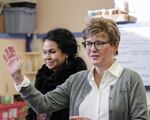At Bridger K-8 in Southeast Portland, Laurie Shonkwiler’s fifth grade class started an experiment on water filtration.
Employees from Portland General Electric led the lesson, explaining how their company uses water filtration.
“Humans do this because we use up water and then we need to clean it for us to reuse,” said PGE’s Whitney Welsh. “The electric company does this as well when we’re working in our hydro sites on rivers, dams. We’re making sure the water is staying clean so when it gets back to the environment, other things can keep using it.”

Students decide the turbidity of a water sample at Bridger K-8.
Elizabeth Miller / OPB
The classroom is visibly one that cares about the environment. Posters around the classroom feature drawings of climate march signs and a message to reduce plastic use. There are a few reusable water bottles on the tables where students sit.
And on a ledge on one side of the room rests a large piece of artwork depicting a salmon, made from single-use plastics out of the school cafeteria.
Wearing a “Plastic Straws Suck” T-shirt, teacher Laurie Shonkwiler walked around the class helping students.
After 34 years of teaching, Shonkwiler made climate change a priority for the last two school years. She said students are engaged in her lessons.
“They’re not afraid, they’re out there just making the change,” Shonkwiler said.
In the middle of class, PGE CEO Maria Pope and Superintendent Guadalupe Guerrero announced the news.
"We’re here to announce a first-in-the-nation … partnership around open-source, K through 12 climate change curriculum,” Pope said.

Teacher Laurie Shonkwiler passes out material for a water filtration experiment at Bridger K-8 in southeast Portland.
Elizabeth Miller / OPB
Students in Shonkwiler’s class already compost, have zero-waste lunch Fridays, and sing songs to help raise awareness schoolwide. In groups of two, the students shared their efforts with Guerrero, Pope and a large gathering of adults there for the announcement.
“We are passionate about being fifth grade activists that take care of our Mother Earth,” one student said. “We like to call our planet Mother Earth because our earth provides us with all the resources we need to live, but for some reason we’re killing it bit by bit.”
By fall 2021, every PPS school will have lessons like the one at Bridger. And lessons are expected to extend beyond science class to social studies or history.
The district’s climate justice programs manager, Nichole Berg, is tasked with bringing the curriculum to the masses.
“We are working K through 12 to create more interdisciplinary learning for students,” Berg said.
The funds from PGE will go to the Fund for Portland Public Schools, the new nonprofit responsible for raising funds and creating partnerships with corporations, nonprofits and individuals, which took over those responsibilities from All Hands Raised last year.
The Fund for PPS will be a fiscal manager of the PGE funds, covering costs from the climate change curriculum development.
Berg said the $250,000 will help launch a two-week program for students and teachers to develop a climate change elective for high schools.
“It takes a very large village to make this sort of thing happen,” Berg said.

Portland General Electric president Maria Pope announced a $250,000 investment in Portland Public Schools' climate literacy curriculum.
Elizabeth Miller/OPB
This latest news is another step forward for the climate change curriculum, which came about after students around the district demanded at school board meetings that climate change lessons be implemented.
Bridger students were part of the effort, which Pope acknowledged as a reason for PGE's decision to give money to the district.
“Thank you for all of your loud voices in this,” Pope said.
In sharing their stories, students talked about fundraising for a beach cleanup trip to the coast by selling beeswax wraps. They asked the adults in the room to make a pledge to use less plastic.
Among the adults in the room was Matthew Gross, who spends time in schools around the state, helping with lessons like Bridger's water filtration exercise. He works for In4All, a Beaverton-based nonprofit that works with companies like PGE.

Students ask for pledges to reduce plastic. The pledges, written on pieces of paper, will form a backdrop for a salmon sculpture made of single-use plastic from the school cafeteria.
Elizabeth Miller / OPB
He said the investment shows a commitment to fighting climate change and supporting students like those at Bridger.
“These are students who I know are already passionate about this work and it’s just going to take it to the next level to have this climate curriculum,” Gross said.
Gross said teachers and students in other districts will be able to benefit from the open-source curriculum as well.
